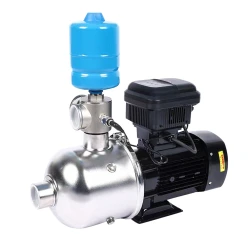What is the disadvantage of booster pump?
2023-10-21
While booster pumps serve a valuable purpose by increasing water pressure in plumbing systems, they also come with certain disadvantages and challenges. Here are some common disadvantages of booster pumps:
1. Energy Consumption: Booster pumps require electrical power to operate, and they can consume a significant amount of energy. This can lead to higher electricity bills, especially if the booster pump runs continuously or frequently, which is often the case in buildings with high water demand.
2. Initial Cost: The installation of a booster pump involves an upfront cost for the pump itself, as well as for the necessary plumbing modifications and electrical work. This cost can be a barrier for some homeowners or businesses.
3. Maintenance: Booster pumps need regular maintenance to ensure their continued efficiency and longevity. Routine tasks may include cleaning, lubrication, and inspection. Neglecting maintenance can lead to breakdowns and reduced performance.
4. Noise: Some booster pumps can generate noise during operation, which may be bothersome, particularly in residential settings. Selecting a quieter model or proper sound insulation can help mitigate this issue.
5. Over-Pressurization: If not properly designed or controlled, booster pumps can lead to over-pressurization in the plumbing system. Excessive water pressure can damage pipes, fixtures, and appliances, and it may not comply with plumbing codes and regulations.
6. Water Quality: Booster pumps can sometimes create conditions that contribute to water quality problems. For example, if the booster pump is not adequately maintained, it may become a breeding ground for bacteria, which can affect water quality.
7. Reduced Lifespan of Appliances: Excessive water pressure resulting from a booster pump can lead to a shorter lifespan for appliances, fixtures, and pipes. It may cause leaks and damage over time.
8. Dependency on Electricity: Booster pumps rely on a continuous power supply to function. In the event of a power outage, water pressure may drop significantly, affecting water supply to the building.
9. System Complexity: Adding a booster pump to a plumbing system introduces complexity. This complexity can make troubleshooting issues and repairs more challenging and may require professional expertise.
10. Compatibility: Booster pumps must be properly sized and matched to the specific requirements of the building and plumbing system. Choosing an inappropriate or oversized pump can lead to inefficiencies and other issues.
To mitigate these disadvantages, it's essential to properly design, install, and maintain booster pump systems, ensure they are appropriately sized, and implement suitable control mechanisms. Regular maintenance and monitoring can help address some of these challenges and extend the lifespan of the booster pump while minimizing associated issues.



